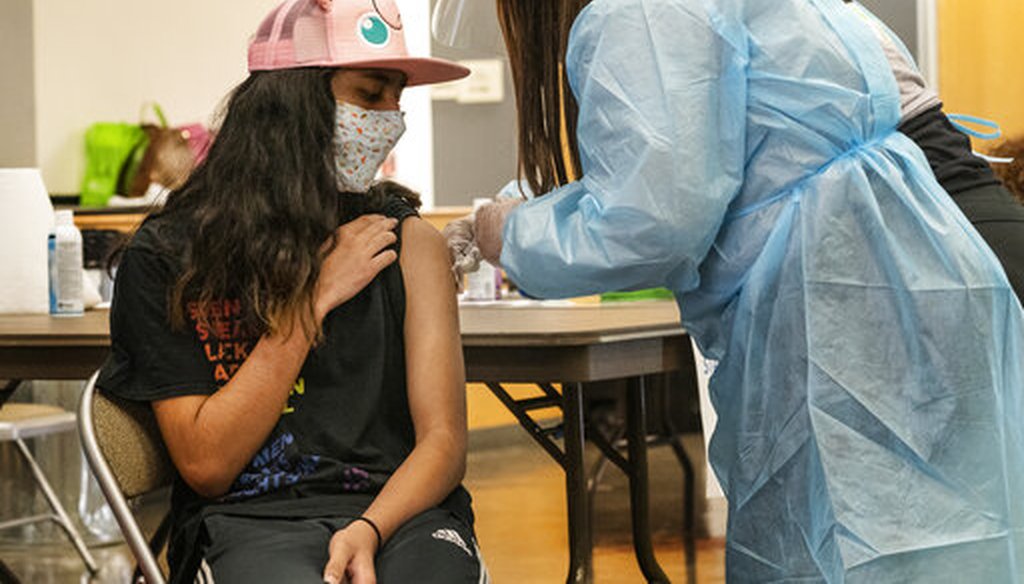Stand up for the facts!
Our only agenda is to publish the truth so you can be an informed participant in democracy.
We need your help.
I would like to contribute

If Your Time is short
• Public health officials have noted four “variants of concern” that are circulating in the United States. Of these, the one that is spreading most aggressively is known as the delta variant, which was first identified in India.
• Research suggests that Americans who have received a full course of any of the three vaccines approved for emergency use by the Food and Drug Administration — Moderna, Pfizer, and Johnson & Johnson — should feel confident about their degree of protection against all four variants, including delta.
• Scientists say that additional variants will be expected as the pandemic continues, though their severity is impossible to predict.
If you’ve been paying attention to recent news reports about the coronavirus pandemic, you’ve probably heard public health officials say they’re pleased about the dropping rates of cases and deaths due to vaccination in the United States — but that they’re also worried that continued spread of the delta variant could reverse some of those gains.
What is the delta variant? For that matter, what is a variant? And how worried should we be about any of them?
Here are some questions and answers.
A variant of a virus is one that has mutated in a way that bolsters its spread or severity compared with the original strain that emerged in Wuhan, China. "RNA viruses like the coronavirus can mutate when they replicate, especially when circulating at high rates," said Monica Gandhi, a professor of medicine at the University of California-San Francisco.
One bit of good news, Gandhi said, is that coronaviruses do not mutate as readily as influenza viruses do. Still, coronaviruses do mutate over time. The different variants generally produce the same range of symptoms as the original strain of the coronavirus. But the mutations may help the virus spread more effectively from person to person, or have an advantage in sneaking past either natural or vaccine immunity.
Public health officials have noted four "variants of concern," plus seven other "variants of interest" that are not yet considered as worrisome as the "variants of concern." There’s also the most worrisome of the three official categories — "variants of high consequence" — but no variants of this type have yet emerged.
All four of the "variants of concern" are circulating in the United States, although the reach of some variants is waning while others are gaining ground.(The World Health Organization decided earlier this year to to name the variants after Greek letters both to simplify discussion and to limit the stigma from having a variant named for a country.)
The alpha variant was first discovered in the United Kingdom. This variant is believed to be about 50% more transmissible from person to person than the original strain. The alpha variant was blamed for a large coronavirus surge in the U.K. in the fall of 2020 that abated only after a lockdown, said Babak Javid, a professor of medicine at the University of California-San Francisco. Alpha has also been the most common variant in the United States for much of this year, although the delta variant is about to pass it, if it hasn’t already.
The beta variant was first discovered in South Africa. Like the alpha variant, the beta variant is believed to be about 50% more transmissible than the original strain. However, it has not secured a significant foothold in the United States.
The gamma variant emerged most aggressively in Brazil, and it’s believed to be more transmissible than the original strain of coronavirus, though it’s uncertain by how much. The gamma variant did not secure a significant foothold in the United States, but it has become more widespread in the U.S. than the beta variant.
Finally, the delta variant was identified in India and was the driving force behind India’s soaring case rates in the spring of 2021. The delta variant is believed to be more transmissible than the other three variants on this list: After the alpha variant became dominant in the U.K. in March 2021, it took only a few months for the delta variant to knock it from that perch. This suggests that the delta variant may have double the transmissibility of the original strain, Javid said.
What’s less clear is whether the illness caused by any of these variants is more severe. "There’s emerging information for all of these variants that they have an increased severity of infection, but it’s too early to come to a conclusion," said John P. Moore, a professor of microbiology and immunology at Weill Cornell Medical College.
Even if the delta variant doesn’t cause more severe illness — the jury is out on that question — its aggressive transmission will become the most important factor in how the pandemic progresses, experts agree.
"To date, wherever the delta variant has taken hold, it has quickly displaced other variants," said Brooke Nichols, an infectious disease mathematical modeler at the Boston University School of Public Health.
Official CDC data shows the prevalence of the delta variant in the U.S. rising from almost nothing in March to more than 30% in early June, driven by spread in areas with low vaccination rates.
The delta variant will soon become the dominant variant in the U.S. within weeks, if it’s not there already, due to its unusually high rate of transmission, experts said.
Tara Smith, a Kent State University epidemiologist, said that already "in places like California, the delta variant appears to make up about 40% of new cases, and it seems to be fueling the outbreaks in Missouri and Oklahoma."
Research suggests that Americans who have received a full course of any of the three vaccines approved by the Food and Drug Administration — Moderna, Pfizer, and Johnson & Johnson — should feel confident about their degree of protection against all four variants, including delta.
Each of the three vaccines "provide very secure protection against a person developing disease severe enough to require hospitalization," said William Schaffner, a professor of preventive medicine at Vanderbilt University. "Thus, they also protect against needing intensive care unit admission and dying."
But there’s an important nuance: While these vaccines protect the vaccinated individual against serious illness from the variants, they may not protect the individual from mild or asymptomatic infections. In most cases, these infections won’t end up hurting the vaccinated individual, but they could spread the virus to other, unvaccinated people.
"The delta variant is more transmissible than the other variants, and vaccination is slightly less effective in preventing symptomatic infection, while still equally as effective at preventing severe disease, thankfully," Nichols said. "This is what is cause for concern. Delta will continue to circulate even among vaccinated individuals and can still cause severe disease in unvaccinated individuals."
The next-generation strain attracting the most attention is the lambda variant. It was identified in Peru, which has been hard hit by the coronavirus, and has spread to at least 27 other countries. Initial findings suggest higher transmissibility and weakened effectiveness by vaccines, but more research is needed before these results are confirmed.
Another variant attracting attention is known as "delta-plus." Initially found in Nepal, this variant combined mutations from the beta variant with mutations from delta.
"So far it hasn't spread," Javid said of delta-plus. "But until October or November of last year, we hadn't heard about variants of concern at all, and the pandemic isn't over globally, so it's very much a case of, 'Watch this space.’ I think the probability of a variant that completely subverts all vaccine-induced immunity is very low, however, but I would never say it's impossible."
Our Sources
Centers for Disease Control and Prevention, "SARS-CoV-2 Variant Classifications and Definitions," June 29, 2021
Centers for Disease Control and Prevention, "Variant Proportions," accessed July 6, 2021
Kaiser Health News, "New Research Finds J&J Vaccine Has Muscle Against Covid’s Delta Variant," July 2, 2021
Financial Times, "Lambda Covid variant’s ‘unusual’ mutations puzzle scientists," July 2, 2021
Email interview with Monica Gandhi, professor of medicine at the University of California-San Francisco, July 6, 2021
Email interview with Babak Javid, professor of medicine at the University of California-San Francisco, July 6, 2021
Email interview with Brooke Nichols, infectious disease mathematical modeler at the Boston University School of Public Health, July 6, 2021
Email interview with Tara Smith, Kent State University epidemiologist, July 6, 2021
Email interview with William Schaffner, professor of preventive medicine at Vanderbilt University, July 6, 2021
Interview with John P. Moore, professor of microbiology and immunology at Weill Cornell Medical College, July 6, 2021








































